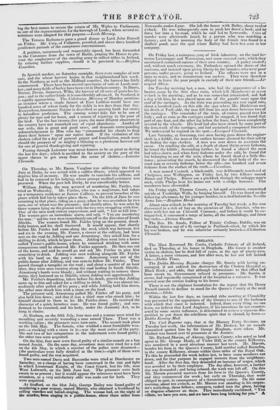On Thursday, as Mr. Baron Vaughan was addressing the Grand
Jury at Derby, he was seized with a sudden illness which appeared to
deprive him of memory. He was unable to conclude his address, and had to be removed to his lodging, where prompt medical assistance was procured. When the post left Derby, he was considerably better.
William Jobling, the man accused of murdering Mr. Fairies, was tried on Wednesday. Mr. Fairies, who was a magistrate, had taken up a temporary residence at Jarrow Colliery, to prevent breaches of the peace which had lately taken place there. On the 18th of June be was returning to that place, riding on a pony, when be was overtaken by two men, one of whom was the prisoner ; and shortly after, be was seen by three women lying on the ground with the two men struggling with him. One of the men used violent expressions, and said, " Let us kill him." The women gave an immediate alarm, and said, " You are murdering the man :" and the two men immediately ran off in the direction of South Shields. The women found Mr. Fairies lying on the ground, dread- fully beaten' and his skull fractured. It would appear, that shortly before Mr. Fairies had come along the road, which was between five and six in the evening, Mr. Foster, a viewer at the colliery, had been met on the road by Jobling and one Armstrong: they asked him for a shilling to drink, which he'gave them. Jobling then went into a house called 'Turner's public-house, where be remained drinking with some companions until he observed Mr. Fairies approach. He then ran out of the house, and said he would go and ask Mr. Fairies to give him something to drink. Jobling was seen walking alongside Mr. Fairies with his hand on the pony's mane. Armstrong went out of the public-house after Jobling, and was seen to follow Mr. Fairies. They passed through a turnpike on the road ; and about a quarter of an hour after, they were seen running along the road leading to South Shields. Armstrong's bands were bloody ; and without waiting to remove those stains, they hastened on to Shields, where Jobling was apprehended.
Mr. Fairles's deposition, taken before his death, proved that Jobling- came up to him arid-asked -for a shilling to drink. He was almost im- mediately after pulled off his pony ; and while Jobling held him down, the other man struck him with a stone on the head.
The prisoner said, Armstrong pulled Mr. Fairies off his pony, and also held him down ; and that it was a third man who struck him ; he himself shouted to them to let Mr. Fairies alone. He received the character of a quiet, harmless man. He was found guilty; and con- demned to be executed, and his body, under the Anatomy Act, to be hung in chains.
• At Durham, on the 30th July, four men and a woman were tried for assaulting and severely wounding a man named Thew. Thew was a working collier; the prisoners were turn-outs. The assault took place on the 10th May. The female, who wielded a most formidable wea- pon-La stocking with a stone in it—was the most active of the party. She and two of her -companions in the indictment were found guilty; the other two were acquitted.
• On the 31st, four men were found guilty of a similar assault on a boy named Jowitt. On the same day, seventeen men were tried for a riot on the 4th May, in which a number of the police were disarmed— (the particulars were fully detailed at the time)--eight of them were found guilty, and the rest acquitted.
Two men named Davis and Bascombe were tried at Dorchester on Saturday, on a charge of having been concerned in the riot and fight M which Lieutenant Knight, of the Coast Guard, lost his life, near West Lulworth, on the 28th June last. The prisoners were both sworn to as present ; but it would appear the witnesses must have been mistaken, as a. very satisfactory alibi was made out for both. They were acquitted.
At Stafford, on the 31st July, George Bailey was found guilty of p9or women,:nrinted Martin, who obtained a livelihood by selling matches and ballad-singing. The woman bad, on the night of the raUrde4 been singing hi a public-house, about three niileS finin Neweastle-under-Lyne. She left the house with Bailey, about twelve o'clock.. He was subsequently seen to °push her down a bank, and tow force her into a by-road, which he said led to Newcastle. Cries a murder were afterwards heard, by a person • who was watching a factory; and in the morning the body of the female was found in a shallow pond, near the spot where Bailey bad been last seen in her company.



























 Previous page
Previous page